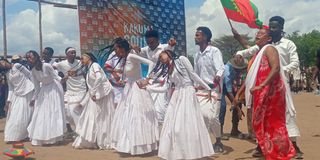Kakuma Refugee Camp and adjacent Kalobeyei Integrated Settlement in Turkana West are home to 257,498 asylum seekers and refugees from more than 15 nations.
They live in separate zones and blocks because of cultural diversity, and have, for years, been in conflict not only with the host Turkana community but also among themselves.
Ms Shurani Hota Biclaire, a refugee from the DR Congo, recalls that despite staying under deplorable conditions like harsh weather and poor sanitation due to congestion, ethnic and nationalist hatred is rife.
She recounts an incident in November 2014, when hundreds of Congolese and Burundian refugees fled the camp following fights due to a motorcycle accident in which a Burundian man hit a Nuer boy. The Nuer (South Sudanese) fought Burundians and Congolese.
The intense animosity lasted for more than two weeks and left eight people dead, with police later arresting and preferring charges against 100 suspects.

Ms Safi Kisasa Estella, a refugee from the Democratic Republic of Congo and a member of the Kakuma Sound Music Band, during an interview at the Kakuma Refugee Camp.
Photo credit: Sammy Lutta I Nation Media Group
Some refugees, mainly women, have now come together and formed a music band that is using songs an dance to end the conflicts. Kakuma Sound Music Band is gaining popularity.
“We have leaders at various levels in the camp who have been holding frequent meetings to advocate peaceful coexistence with support from the United Nations High Commissioner for Refugees (UNHCR) and the Kenya government.
“But to make the mission for integration more impressive, we decided that as women we must play a primary role; that is why we came up with Kakuma Sound Music Band,” says Ms Biclaire, the band leader.
Membership
The band currently has more than 32 members that include South Sudanese, Rwandese, Congolese, Somalians, Burundians, Sudanese, Ugandans, Ethiopians and Kenyans, among other nationalities.
They came together to foster inclusion, resilience and peaceful coexistence, packaging messages of peace and unity through traditional African music.
“We were inspired to compose a song about unity in Africa after realising that just like in the camp where our children grow up knowing that certain blocks belong to some nationalities and they can’t freely go and interact with their peers, African countries need to be united by removing visa restrictions.
“We are leading by example by first advocating integration among ourselves as we work on a bigger picture of advocating for a united Africa,” Ms Biclaire says.
At the second edition of Kakuma Sound Festival held at the camp and attended by officials from the United Nations Educational, Scientific and Cultural Organisation (Unesco), UNHCR, the county government and development organisations supporting refugee affairs on Monday, the band thrilled guests with soulful voices conveying the message that Africa should unite so that its enormous population and resources become a competitive advantage that can move the continent out of poverty.
“During our performance, no one will easily notice how many nationalities were there because we were all singing at the top of our voices, dancing in traditional regalia to drum beats. Africans must love each other. Our governments should remove cross-border barriers that hinder movement from one country to another,” she adds.
The band got equipment from Kakuma Sound Community-Based Organisation, which, according to co-founder Treynor Tumwa, facilitated culture experts from their countries of origin to train them in how to use the equipment and compose songs.

A group of refugees from Ethiopia performing during the Kakuma Sound Cultural Festival at the Kakuma Refugee camp.
Photo credit: Sammy Lutta I Nation Media Group
“I was impressed by the turn-up of youths, most of whom were born in the refugee camp and had little or no knowledge about their culture. Through such a musical band and groups, diverse cultures were showcased for the young generation to learn while preserving them through continuous practice and interactions among members.
“The performances blended well with the theme of the day: Conserving the past, composing the future,” Mr Tumwa says.
Ms Safi Kisasa Estella, another refugee from the DR Congo, says by first uniting to form the group, they have broken barriers of separations in the camp as they visit each other frequently to practise.
“The band has united us all. We don’t have boundaries as all nationalities are welcome to join. The members are passionate people who sing for peace, passion and as proud Africans. The songs release the stress of our suffering in the camps too,” she says.
For Ms Nyaluak Reath, an Ethiopian youth in the group, she benefits a lot from the older women who teach them African values. “This is also important because many young people are embracing inter-marriages. By joining to interact with older members or by listening to the songs, it is easier to be accepted in different cultures,” she says.
Mr Isaac Uyira Ubur, a South Sudanese, says he is already feeling the impact of the band as he is able to move freely within the camp and integrate with other nationalities as they sing songs of unity inspired by the band.

Kenyan singer and songwriter Eric Wainaina performs alongside Kakuma Sound Music Band at the Kakuma Refugee camp.
Photo credit: Sammy Lutta I Nation Media Group
The band was mentored by Kenya’s Eric Wainaina and rapper Juliani, who helped them compose songs that promote unity and motivated them by singing and dancing together.
They perform at various events in the camp but hope to move to bigger stages like the upcoming annual Turkana Tourism and Cultural Festival slated for August, as well as national and international events.

